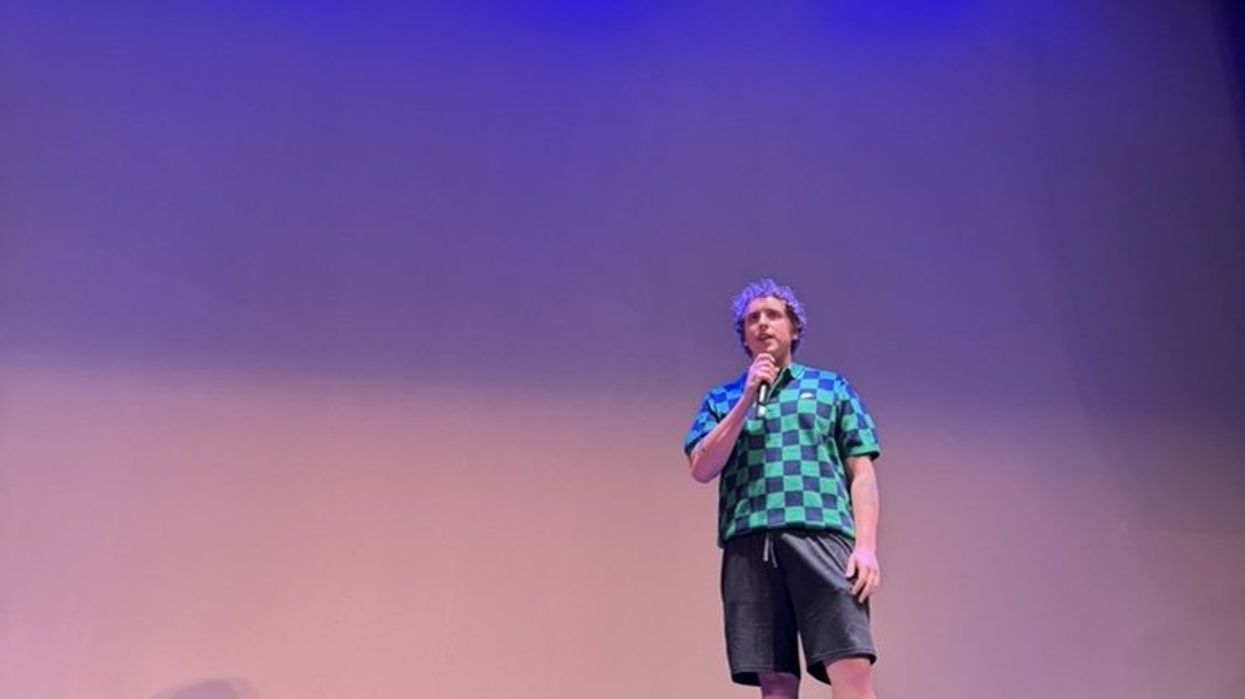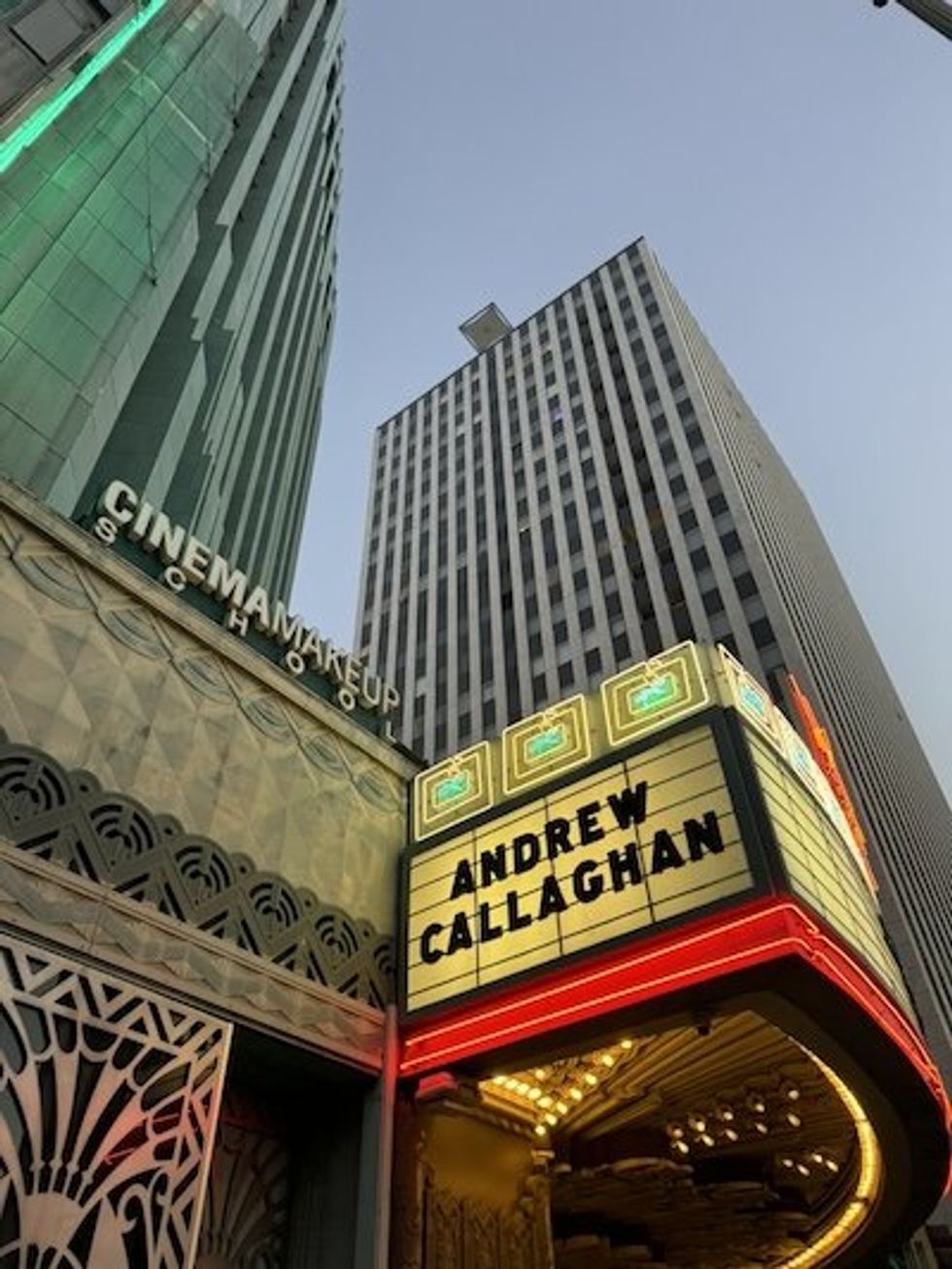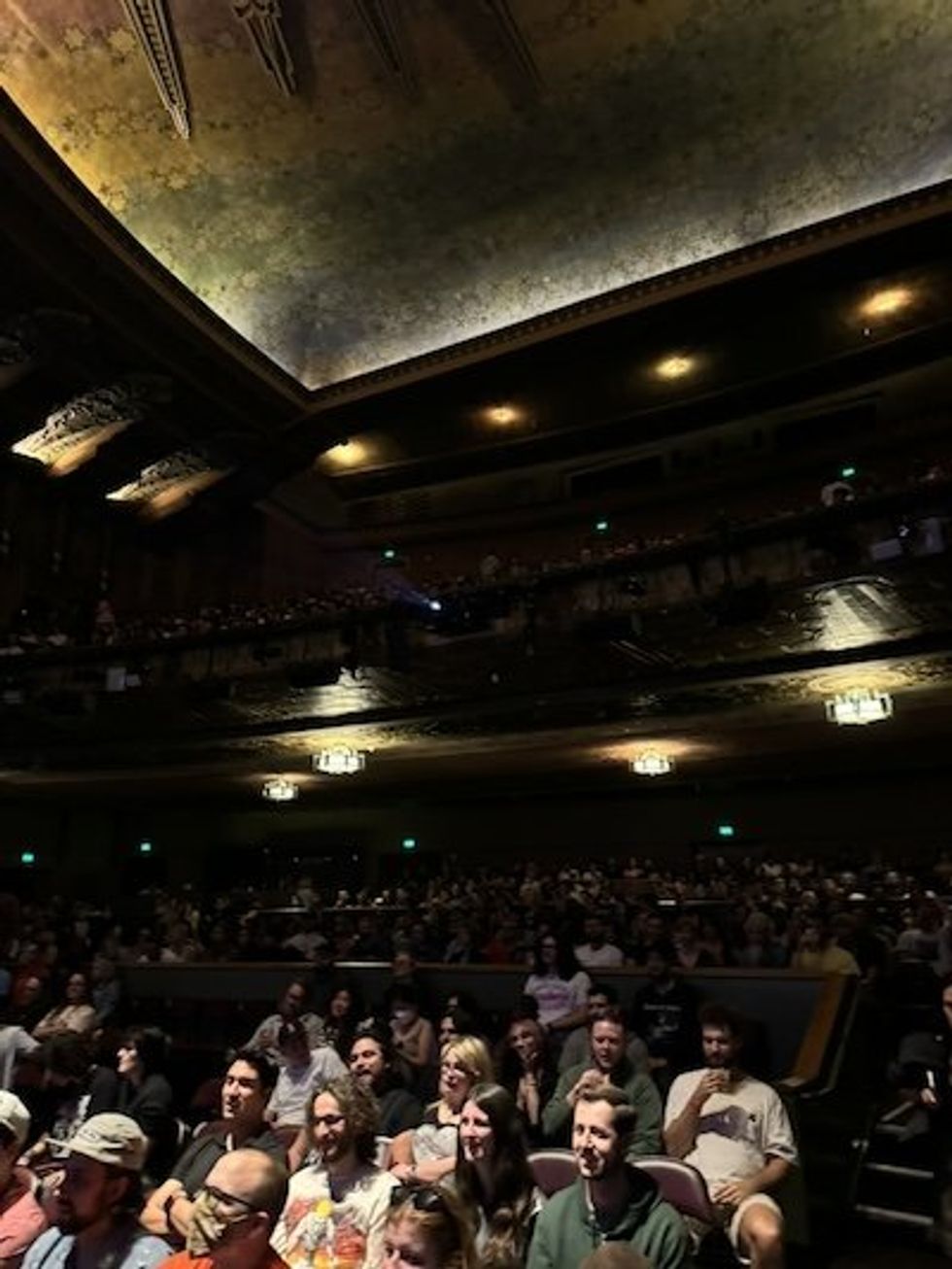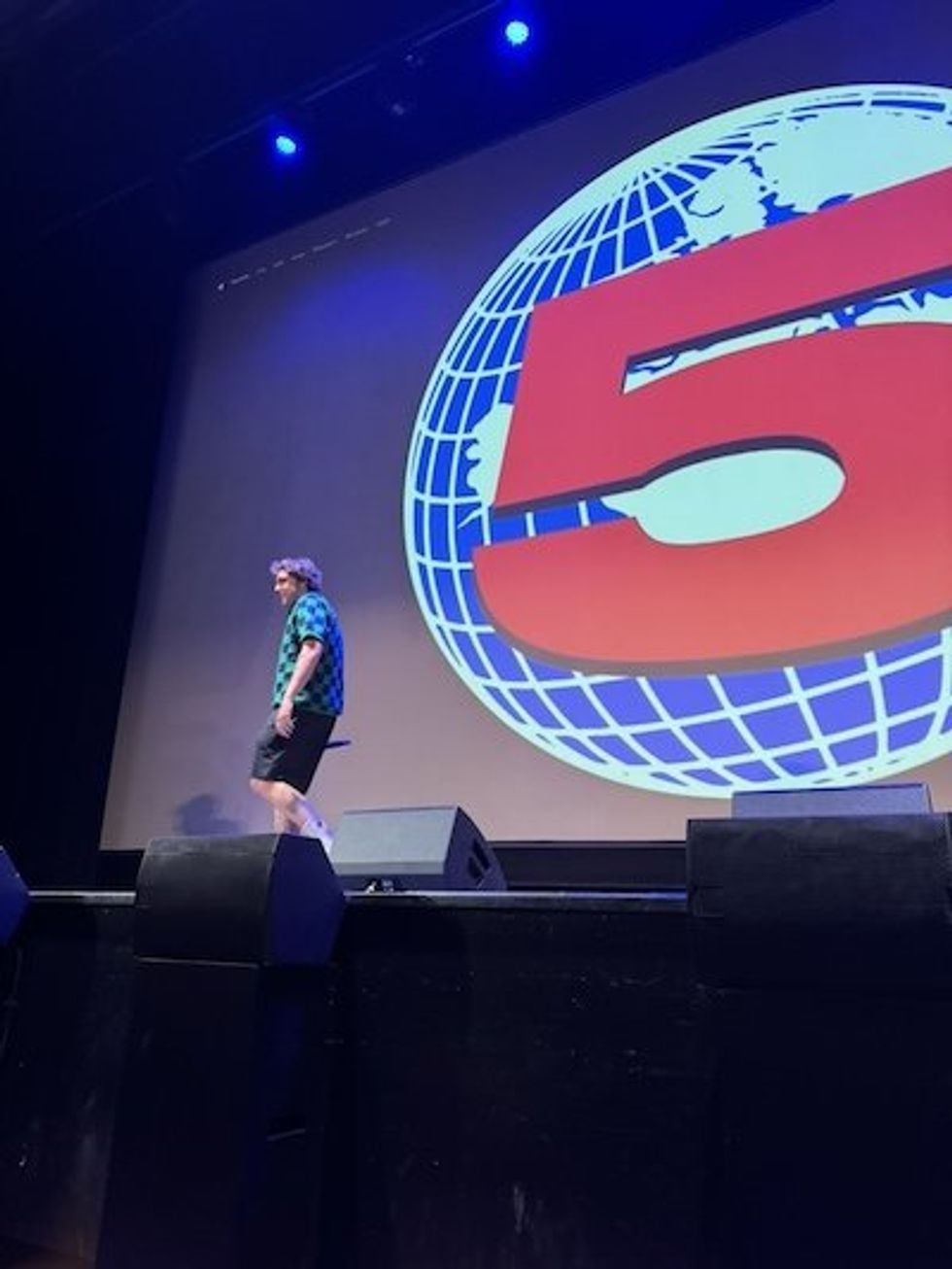
Isaac Simpson

Andrew Callaghan undermines his portrait of an obsessive Trump supporter with empty, self-indulgent therapy-speak.
Andrew Callaghan is Gen Z’s favorite gonzo journalist, or was, at least, before he got canceled early last year for “sexual misconduct.”
The cancellation came shortly after HBO premiered Callaghan’s feature film debut, “This Place Rules,” a documentary about the 2020 presidential election. It gave Callaghan a bigger budget to do the same man-on-the-street videos that first elevated him on YouTube, where he still has 2.7 million followers. As we learned from "Hawk Tuah Girl," man-on-the-street is as big among Gen Z as prior generations, only they consume it via the scroll.

But Callaghan isn’t your average man-on-the-streeter. He goes deeper and farther into “real life” than other YouTubers. He approaches the kind of characters more cautious interviewers avoid, the kind you would assume have no incentive whatsoever to appear on camera: Antifa foot soldiers, rioters, drug dealers, homeless people.
And yet they talk to Callaghan; there’s something about Callaghan’s awkward, innocent, pimply-faced teenage demeanor that slices through barriers. He’s the opposite of Alex Jones, who is all libido, id, and agenda: concave. Callaghan takes it all in, he listens intently, doesn’t judge: convex.
Then there’s his editorial genius. I love Werner Herzog because his documentaries are about everything besides the subject. The camera always lingers a bit too long. The interviewee breaks character. Maybe something occurs behind them. We see something we weren’t supposed to see. These little ironies make the audience belly-laugh, or they move us with great power — strange synchronicities that make us feel less alone.
Indeed, the first part of Callaghan’s new documentary, “Dear Kelly,” is filled with these Herzog-ian moments — as when an onlooker trips and falls at the exact moment a woke interview subject says something grating — and the result is total gonzo brilliance.
Callaghan has a tendency to drink beer and interview subjects in bathrooms, a trend he keeps up throughout the movie. At one point and “because reasons,” he throws a big party at Chico State, where he gets many awesome drunk bathroom interviews in which he himself seems nicely wasted, which comes off as endearing.
At the party we also witness a fistfight, which seems to genuinely excite Andrew; we, the audience, see his danger-seeking edge. But within fifteen rapid cuts of the fight, the two bloodied fighters drunkenly hug it out. You see this in Hollywood comedies, but very rarely do you see the real thing.
“Dear Kelly” is a short, immaculately edited, feature-length documentary about a man named Kelly J. Patriot, one of those sign-waving MAGA enthusiasts you see in all the protest videos. His favorite flagpole can fit four flags on it.
In one moment, Callaghan shows us one of Kelly’s heart-wrenching home videos from the 1990s, a time before his life was consumed by obsession. The camera freezes perfectly on a retro can of Bud Light. The audience immediately understood the reference and roared with laughter.
In another moment, Callaghan interviews Kelly’s kids, lesbian daughter and White Boy Summer-coded son together. The son goes off on a slight tangent “... not that I don’t love capitalism, but …” and the daughter cringes, starts to interject, then stops herself. A beautiful sibling moment in 2024, reflective of the most politically polarized generation yet, in which the men and women are straying apart in unprecedented fashion.
I saw the film at the Wiltern in Los Angeles on the last night of its 38-city premiere tour. I felt ancient amid what appeared to be a sold-out crowd of 2,300 Zoomers in their casual Sunday Dodgers hats.
My very pregnant wife’s belly seemed to stick out another foot or so, garnering looks or intentional ignores from the sea of scuzzy kids. I haven’t seen so many “young people” in one place since last time I ended up at trending Silverlake cocktail bar Tenants of the Trees, and it was a similar crowd. Everyone dressed like they’re in a Macklemore video. Many seem nonbinary.
Touring a documentary release like a concert is a genius idea for a scroll star — a way to monetize your audience for its full value, so the social platforms don’t drink all your milkshake. Callaghan himself introduced the film, and certain elements were tweaked to be Los Angeles-specific.
At the beginning of the screening, a QuickTime screen reading “Dear Kelly LA Cut” was dragged across a desktop to the center of the screen. Callaghan said, “We just exported the L.A. cut 15 minutes ago,” and the whole janky DIY vibe drew great cheers from the audience.
At one point, the show stopped and a rapper named Uncle Bill, featured in the documentary, performed live on stage. Other clever “utility” plays included mystery bundles for sale on the website and a moderated Q&A with Callaghan after the show, which we couldn’t stay for because we had to relieve the babysitter.

Initial publicity for “Dear Kelly” suggested it would be about Kelly J. Patriot “ saving Callaghan’s life.” And in its early sections, the film does seem as though it’s working up to a sympathetic, or at least nuanced, portrayal of Trump supporters.
The film opens on what is supposed to be a “White Lives Matter” rally in Huntington Beach, where Callaghan encounters Kelly J. Patriot.
It’s a truly incredible scene, epic in scale. Antifa “counter-protesters” mob an intersection, waiting for the marching army of white supremacists, which of course never shows up, having failed to materialize from the fevered imagination of the media.
The only person who does show up? Kelly J. Patriot, waiving his quartet of MAGA flags. Kelly doesn’t even know why he’s there. It’s Callaghan who has to tell him about the “White Lives Matter” rally; Kelly just heard there was a chance to protest.
The counter-protesters are happy to oblige Kelly with a thorough beating. It’s one against a hundred. Kelly’s bloody but unbowed. You get the sense that this is exactly what he came for.
Callaghan lets this scene play out transparently — no spin. Thus the media comes off as culpable, and Antifa, who are exactly the type of fat, mouth-frothing dysgenic freaks the right thinks they are, come off as dangerous, disturbing bullies. The cops look bad too. They end up ignoring the Antifa troops and arresting Kelly instead, for “wielding a weapon,” e.g. his giant flagpole. Kelly looks like the hero.
Callaghan also takes a jab at cringey media libs when he reveals that “This Place Rules” producers pressured him to make a heartfelt speech in support of Biden for the film, which made him deeply uncomfortable. We see a clip of him attempting to do their bidding, which feels pure 1984.
Callaghan seems poised to confront biases about Trump and the fervor he inspires. Maybe beneath their lowbrow political theatrics, these MAGA people have as profound an understanding of America as the liberals who find them so alarming. Maybe they’re on to something.

Unfortunately, the honesty with which Callaghan first portrays Kelly soon turns patronizing .
The plot hinges upon a surprising answer Kelly gives to Callaghan’s usual open-ended questioning. Kelly reveals that it’s not necessarily political fervor that drives him, but hatred of a predatory lender named Bill Joiner who screwed him over. Callaghan, smartly, seizes on this bit of information and pursues it.
Zeroing in on the topic of Joiner allows Callaghan to get to know Kelly. It also provides Callaghan with the thesis that gives the movie its structure — political obsessives like Kelly are actually driven by a past trauma that deprived them of their Maslowian needs — home, safety, family, etc.
Sure enough, it turns out that Kelly lost his home and family to Joiner, whom he now obsessively stalks. His obsession with attending MAGA street protests is a kind of extension of his obsession with Joiner. Joiner and the evil regime MAGA purports to fight aren’t exactly one and the same in Kelly’s mind, but they’re definitely related.
As Callaghan and Kelly become what you might call friends, Callaghan decides to take Kelly’s claims seriously enough to begin investigating Joiner. And here is where Callaghan’s genius begins to give way to his youth.
While the duo’s search for Joiner allows for a fun interlude in which they dress up in ghillie suits to approach their quarry’s home, it ultimately proves unsuccessful. Not finding Joiner is a huge narrative problem, at least if Callaghan wants to do justice to Kelly as a character.
As a filmmaker, Callaghan had three choices at this point: 1) admit you don’t have enough for a feature and move on to something else; 2) pivot to exposing the absurdity of Kelly being unable to trace or contact the man who had him evicted from his home; or 3) double down on your thesis: that it’s really all Kelly coping with his trauma.
He chooses number three, and the film falls apart. The quick, funny takes are replaced with long, boring speeches full of therapy-speak. There’s nothing about Kelly saving Callaghan’s life, besides a quick reference to Kelly calling Callaghan after he was canceled.
In fact, “Dear Kelly” is more accurately described as Callaghan throwing his unlikely friend under the bus. Callaghan clearly reveals our country as a place where an angry mob of “protesters” are free to physically assault a man for displaying a flag and where police are free to arrest that same man after deeming his flag a “weapon.”
And Kelly’s the one who’s driven by psychotic delusions?
Concluding that “trauma” is Kelly’s problem lets Callaghan and his audience avoid pondering any uncomfortable political solutions: We just need to get this poor guy some therapy.
Callaghan’s timidity as a filmmaker inadvertently results in an incisive portrayal of his generation. At their core, they’re what we’d call “post left,” bulls**t-resistant and not easily swayed by the usual appeals to the Big Boomer Stories about oppression, Whig history, and Good Versus Evil. They dislike being told what to think and say and admire those who express the blunt truth, no matter who it offends.
They also don’t shy away from traditional displays of masculinity, like the kind of public brawling unthinkable to your average Millennial yuppie.
And yet, much like “Dear Kelly” itself, this rough-and-tumble exterior conceals a soft, gooey center. All of the misbehavior comes with a disclaimer: No matter what we do to you, we’re still the victims. Yes, we may be ugly, we may be violent, we may believe the craziest sh** and think nothing of caving your head in with a bike lock. It simply can’t be helped, you see, because of our trauma.
Isaac Simpson